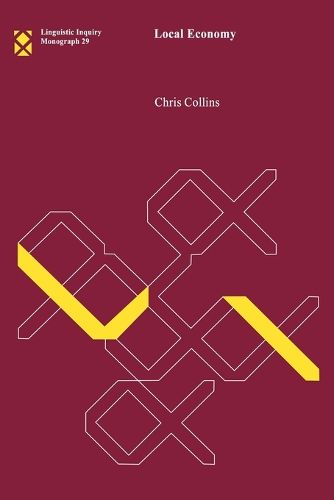Readings Newsletter
Become a Readings Member to make your shopping experience even easier.
Sign in or sign up for free!
You’re not far away from qualifying for FREE standard shipping within Australia
You’ve qualified for FREE standard shipping within Australia
The cart is loading…






Any theory of grammar must contain a lexicon, an interface with the mechanisms of production and perception (PF), and an interface with the interpretational system of semantics (LF). A traditional way to relate these three components in generative theory is through a derivation. Noam Chomsky’s Minimalist Program postulates that grammatical derivations are constrained by economy conditions, requiring that derivations be minimal. One of the most important questions of syntax is what the economy conditions are and how they operate.In Local Economy, Chris Collins proposes that economy conditions are local. According to this theory, evaluating economy conditions does not involve comparing whole derivations. Rather, economy conditions are evaluated at each step in the derivation. Collins shows that locative inversion and quotative inversion provide strong arguments for local economy. In addition, he explores the far-reaching consequences of this proposal for other areas of syntax, including the strict cycle, binary branching, successive cyclicity, and expletive constructions. He demonstrates that local economy is superior to global economy on conceptual as well as empirical grounds.Local Economy is one of the first books other than Chomsky’s The Minimalist Program (MIT, 1995) to deal in a general way with economy of derivation and Minimalism. Linguistic Inquiry Monograph No. 29
$9.00 standard shipping within Australia
FREE standard shipping within Australia for orders over $100.00
Express & International shipping calculated at checkout
Stock availability can be subject to change without notice. We recommend calling the shop or contacting our online team to check availability of low stock items. Please see our Shopping Online page for more details.
Any theory of grammar must contain a lexicon, an interface with the mechanisms of production and perception (PF), and an interface with the interpretational system of semantics (LF). A traditional way to relate these three components in generative theory is through a derivation. Noam Chomsky’s Minimalist Program postulates that grammatical derivations are constrained by economy conditions, requiring that derivations be minimal. One of the most important questions of syntax is what the economy conditions are and how they operate.In Local Economy, Chris Collins proposes that economy conditions are local. According to this theory, evaluating economy conditions does not involve comparing whole derivations. Rather, economy conditions are evaluated at each step in the derivation. Collins shows that locative inversion and quotative inversion provide strong arguments for local economy. In addition, he explores the far-reaching consequences of this proposal for other areas of syntax, including the strict cycle, binary branching, successive cyclicity, and expletive constructions. He demonstrates that local economy is superior to global economy on conceptual as well as empirical grounds.Local Economy is one of the first books other than Chomsky’s The Minimalist Program (MIT, 1995) to deal in a general way with economy of derivation and Minimalism. Linguistic Inquiry Monograph No. 29